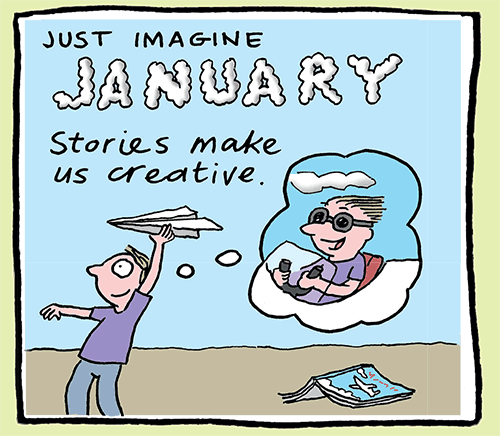
Just-Imagine January:
Stories Make Us Creative
(So do calendars. I started my Laureate time in March 2018, so I didn’t get to write about January till ten months later.)

Happy New Year, laureate friends, supporters, toilers, observers, encouragers and enablers. Hope you had a good break.
I used mine to look back over my first laureate year, which left me feeling grateful it’s a two-year gig. Last year I was able to cover a lot of territory and share a lot of ideas, thanks to everyone above, but there’s heaps more to do and I’m very glad I’ve got another twelve months to spread the word even more widely.
I’ve been working on a new book these past few weeks, and also squeezing in some reading. Like all good holiday reading, mine lit up the year ahead with exciting ideas and possibilities, and at the same time cast thought-provoking perspectives across the year just ended. Which is exactly what one hopes for in Just Imagine January.
Two books in particular plugged directly into my laureate themes. I’ve been talking and writing a lot about the global challenges the young readers of today will face in their adult years, and the many ways reading and stories help equip them for those challenges.
Michael Lewis’s powerful short book The Fifth Risk explores a cluster of those challenges, ones that are perhaps lower profile than some of the current headline-grabbers, but no less significant. In the clear investigative style that has made all his books best-sellers, from Moneyball to The Big Short and beyond, Lewis looks at what governments are capable of doing for their people, and the many jeopardies people face when governments stop doing those things.
In The Fifth Risk he uses the US government as his case in point, and shows how a vast range of behind-the-scenes initiatives across several federal departments, all enhancing humanity and civilization, not to mention human health and safety, are at dire risk when an incoming administration (no names) steeped in ideology and wilful ignorance, sabotages those initiatives or ignores them or defunds them or places them in the hands of appointees who exploit them as personal cash-cows.
Lewis is a superb story-teller. His characters are real people and their journeys and struggles and triumphs and set-backs are all, to use an old fashioned word, true. But these are stories, as powerful as the most potent fiction, and full of characters doing what characters do best - using their imaginations in all kinds of creative ways to confront the problems in their lives and in their communities. Thinking about unthought-of possibilities. Taking their problems apart and putting them back together in original and exciting ways. As we share their stories, we find ourselves doing the same to try to help them out. Which is not only fun, it’s also very useful, because the more stories we read, no matter whether they’re fiction or non-fiction, the better we get at creative problem-solving.
And how desperately our young people, their civilization being dismantled around them, need those skills. And the resilience to make those skills effective. And the brave hero’s heart, sometimes daunted but never defeated, to be found in the pages of any good story.
Which led me to my other top read this month. Holiday reading, I believe, should not only give you relaxing chuckles and a surges of humanist resolve, it should also add piquancy to the coming year by terrifying you. And Disrupted by Dan Lyons certainly does that.
Dan is a fifty-something journalist whose real-life personal circumstances led him to accept a job in the new corporate world of tech start-ups. A brave new world of disruptive business practices in which everything is changing – including traditional concepts of product, profit, purpose and professionalism – but where the biggest disruption of all is in the working conditions and prospects of young people.
Behind the cool facade of team culture and the illusions of gig-economy independence, millions of underpaid young people in their late teens and twenties are being treated like disposable serfs. Changing this will involve a set of challenges for coming generations as huge as those faced by the pioneers of collective bargaining early last century. The solutions this time will almost certainly be different, but requiring heroism on just as huge a scale.
The official hero’s journey across this new corporate landscape goes something like this. Create a software or online retail concept (doesn’t have to be original). Accept hundreds of millions in venture capital from big investors frantic not to miss out on the next big thing. Spend most of it hyping and marketing your brand. Profit isn’t important. Neither are the prospects for your huge, young, underpaid, participation-hopeful workforce. All that matters is that your turnover continues to grow until your Initial Public Offering, at which point you sell the company to thousands of small investors, handsomely reward your big investors, and walk away a multi-billionaire.
Some young people, even as this is happening around them, even as their employment futures are disintegrating, see this as the journey of a genuine hero. Some don’t. They’re the ones who read books.
Happy reading and writing, and choosing your heroes carefully,

